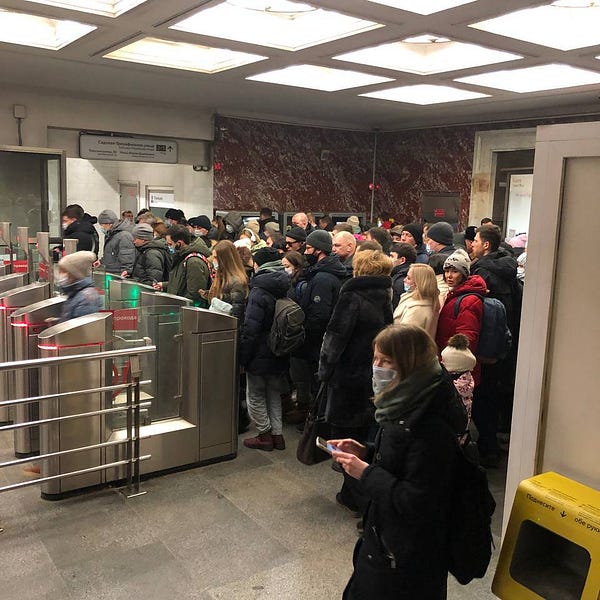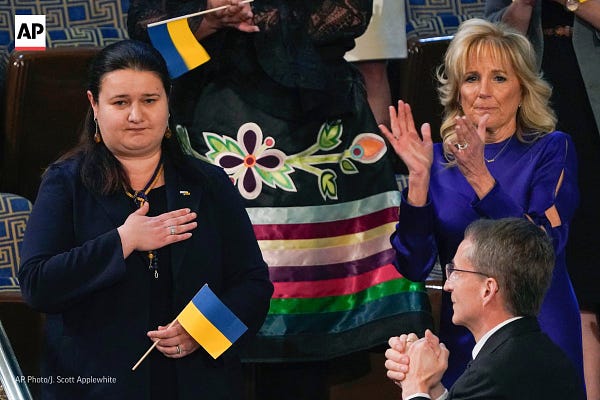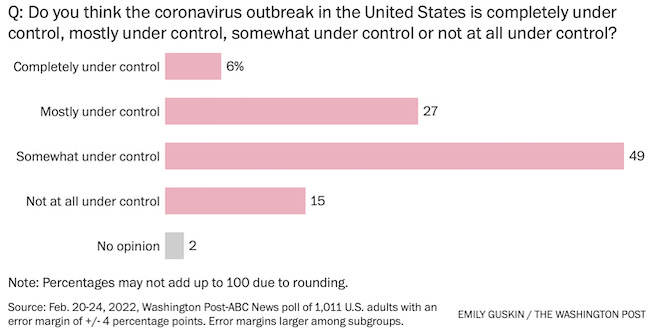Today’s posts that caught my eye:
“President Joe Biden unfurled a resolute defense of democracy in his first State of the Union address, declaring the U.S. would act as a leader for the free world as it rallies with Ukraine against a brutal Russian invasion,” Politico reports. That seems to be what’s at stake in so many current conflicts: The defense of democracy.
From the British Journal of Cancer: Stark disparities in cancer rates between different ethnic groups have been laid bare in new research showing black people are twice as likely to get prostate cancer while white people have double the chance of getting skin and lung cancers.
Summer interns are jilting companies as better offers come along,” the WSJ reports, in a reminder that everything feels upside down.
Know someone who should check out the newsletter? Let them!
The World
Russia began a new, bloodier phase of the war, hitting the center of Ukraine’s second-largest city of Kharkiv with a missile. Ukrainian officials said Russia shelled residential buildings in the southern city of Kherson, with some 300,000 people, as they advanced. Kyiv is bracing for the same kind of indiscriminate shelling of civilian neighborhoods. The Russian defense ministry warned residents to leave some areas of the capital ahead of bombing. A video of the aftermath of a shelling, shared by a resident of a residential district in the northeast of Kherson, showed a crater, blood and body parts. The man who shot the video noted a body had been torn in half. “Can you tell me what happened here?” asked another stunned man in the video. “My relative lives here.” (Wall Street Journal)
Latvia’s president called on the EU to seize its chance to stop being a “political midget” and grant Ukraine candidate status to join the bloc. Egils Levits told the Financial Times that Russia’s invasion of Ukraine was a “moment in history” akin to the fall of the Berlin Wall or the end of the second world war, where “the future is being formed for the next decade”. The Latvian president said the EU should bypass its usual “bureaucratic procedures” and give candidate status to Kyiv before detailed discussions on what reforms would be needed for its entry. (Financial Times)
Analysts say Russian convoy likely signals a shift to invasion strategy: It has been a menacing presence in the war in Ukraine — Satellite images have shown a military convoy stretching 40 miles long on a roadway north of Kyiv, with a number of homes and buildings seen burning nearby. Experts fear the convoy, which includes supply and armored attack vehicles, could be used to encircle and cut off the capital or to launch a full-on assault. The front end of the convoy is just 20 miles from the capital. “What we are seeing is basically Phase 2, which is a shift to much more brutal, tactless, unrestricted warfare, which will lead to many more civilian casualties and bloodier battles,” said Mathieu Boulègue, an expert in Russian warfare at Chatham House. (New York Times)
Russia closed its stock market as the ruble plummets: Russia's central bank said the Moscow Exchange wouldn't open for stock trading through at least Thursday. The exchange was closed on Monday. Meanwhile, President Biden pledged to crater the Russian economy, adding Putin "has no idea what's coming." (Axios, Axios-2)
Roundup: Oil, Boeing, Apple, Google, Ford, Nord Stream 2, air flights, Exxon Mobil, and more:
Oil climbed above $110 a barrel; Boeing suspended major Russian operations and support for Russian airlines; Apple halted all product sales in Russia — on Apple’s Russia store, all Apple products are listed as “unavailable” for purchase or delivery in the country — and removed Russian state-controlled outlets RT News and Sputnik News from its App Store globally; Google blocked RT, Sputnik from Play app store in Europe; Ford suspended operations; a Swiss official said Nord Stream 2 had become insolvent; the U.S. bans Russian flights from American airspace. (Financial Times, CNBC, Reuters, Axios)
Google removed tags on Ukrainian Google maps after users said they may have been used to coordinate Russian air strikes. (BuzzFeed News)
Exxon Mobil said it is halting operations at a multibillion-dollar oil and gas project in Russia and will make no further investments in the country. The U.S. oil giant said it is preparing to shut down production from the massive Sakhalin Island development in Russia’s Far East. Exxon is also developing plans for expatriate staff in Russia to leave the country, if the employees wish to do so: “Exxon Mobil supports the people of Ukraine as they seek to defend their freedom and determine their own future as a nation,” the company said. “We deplore Russia’s military action that violates the territorial integrity of Ukraine and endangers its people.” (Wall Street Journal)


Chinese people stranded in Kyiv become target of Ukrainian anger: For hundreds of Chinese students in Kyiv, the sound of Russian artillery is not the only thing that makes them scared. “I dread every time I have to go into the shelter because the locals are hostile now,” said a Chinese student at Kyiv university. A refusal by Beijing to criticize Russia for its invasion of Ukraine and a wave of mockery of Ukraine and glorification of Russian military might on Chinese social media are giving China a bad name in Ukraine, and threatening to derail what Beijing has called a “strategic partnership”. (Financial Times)
China’s foreign minister says easing violence in Ukraine is top priority. (Washington Post)
Former Japanese Prime Minister Shinzo Abe sparked anger from China after calling for Japan to host US nuclear weapons. The idea was prompted by the Russian invasion of Ukraine and reflects concerns about China’s potential to invade Taiwan. (The Guardian)
State of the Union:
President Joe Biden unfurled a resolute defense of democracy in his first State of the Union address, declaring the U.S. would act as a leader for the free world as it rallies with Ukraine against a brutal Russian invasion. With a war raging an ocean away, Biden vowed that the United States would emerge from years of division and disease to protect and expand freedoms at home and abroad. “While it shouldn’t have taken something so terrible for people around the world to see what’s at stake, now everyone sees it clearly,” the president said. “In the battle between democracy and autocracy, democracies are rising to the moment, and the world is clearly choosing the side of peace and security.” (Politico)
Five takeaways from Biden’s State of the Union speech: 1) Standing Ovation for Ukraine: The first 10 minutes were about highlighting a united Western front over Russia’s invasion of Ukraine. It was one of the rare bipartisan moments in the speech; 2) Turning the Page on Covid-19: Biden announced that the disease that hobbled the U.S economy “need no longer control our lives.”; 3) Inflation: Biden sought to sympathize with Americans feeling the pain of inflation at the grocery store check-out and gas pump. His “top priority is getting prices under control.”; 4) China: It was notable that there were only two mentions of China in the hourlong speech, given the increased tensions between the world’s two biggest economies. He only mentioned China in the context of competition and infrastructure; 5) Biden worked to prove his moderate credentials. (Bloomberg)
President Biden’s challenge was to unite Americans behind his confrontation with a brutal Russian leader who has shattered more than three decades of post-Cold War peace without setting off fears that the return of superpower conflict will inflict an unacceptable cost. Yet Biden left unaddressed, at least for now, several of the hardest questions about where America goes next — and how it will ultimately emerge from Putin’s audacious effort to dismantle a world order largely designed in Washington. (New York Times)


In Texas, Greg Abbott, Beto O’Rourke easily won their gubernatorial primaries, setting up a November race. (Texas Tribune)
Stark disparities in cancer rates between different ethnic groups have been laid bare in new research showing black people are twice as likely to get prostate cancer while white people have double the chance of getting skin and lung cancers. The analysis of NHS Digital cancer registration data by Cancer Research UK provides the most complete recording ever of cancer rates by ethnicity in England, offering crucial data on how some rates vary. (The Guardian, British Journal of Cancer)
Most Americans say some restrictions on normal activities should remain in place to try to control the coronavirus, as public wariness of the pandemic lingers even as federal health officials and a growing roster of governors have softened mask advice. (Washington Post)
Hong Kong’s most recent measures to combat Covid-19 are unsettling its large community of bankers and investors, many of whom were already struggling to square business and family commitments with severely curtailed travel. Some financial professionals have asked employers whether they can relocate, while a few expatriates have decided in recent months to resign and move home. Others are considering options that could split up their families for months or more as they try to move their children into more stable schooling and away from the risk of mandatory quarantine. (Wall Street Journal)
South Korea's new daily cases surpassed 200,000 for the first time, surging to 219,241 from 138,989 a day ago. (Nikkei Asia Review)
Australian Prime Minister Scott Morrison tested positive for COVID-19 and was experiencing flu-like symptoms, including fever. (Reuters)
The months of January and February were the driest ever recorded in most of California this year, and state water officials are now sounding the alarm for a third year of severe drought, shrinking water supplies and the growing threat of extreme wildfire. The California Department of Water Resources announced that statewide snowpack had dwindled to 63% of average for this time of year, following an extraordinarily dry start to the year. (Los Angeles Times)
People plucked from rooftops as floodwaters rise in Australia: A deadly storm battering eastern Australia forced tens of thousands of people to flee their homes yesterday as helicopter crews scrambled to rescue those left trapped on roofs by rising floodwaters. As the severe weather system approached Sydney, authorities warned the city’s five million people to brace for severe damage. (The Times)
Economy
Keep reading with a 7-day free trial
Subscribe to Chris Riback's Newsletter to keep reading this post and get 7 days of free access to the full post archives.



